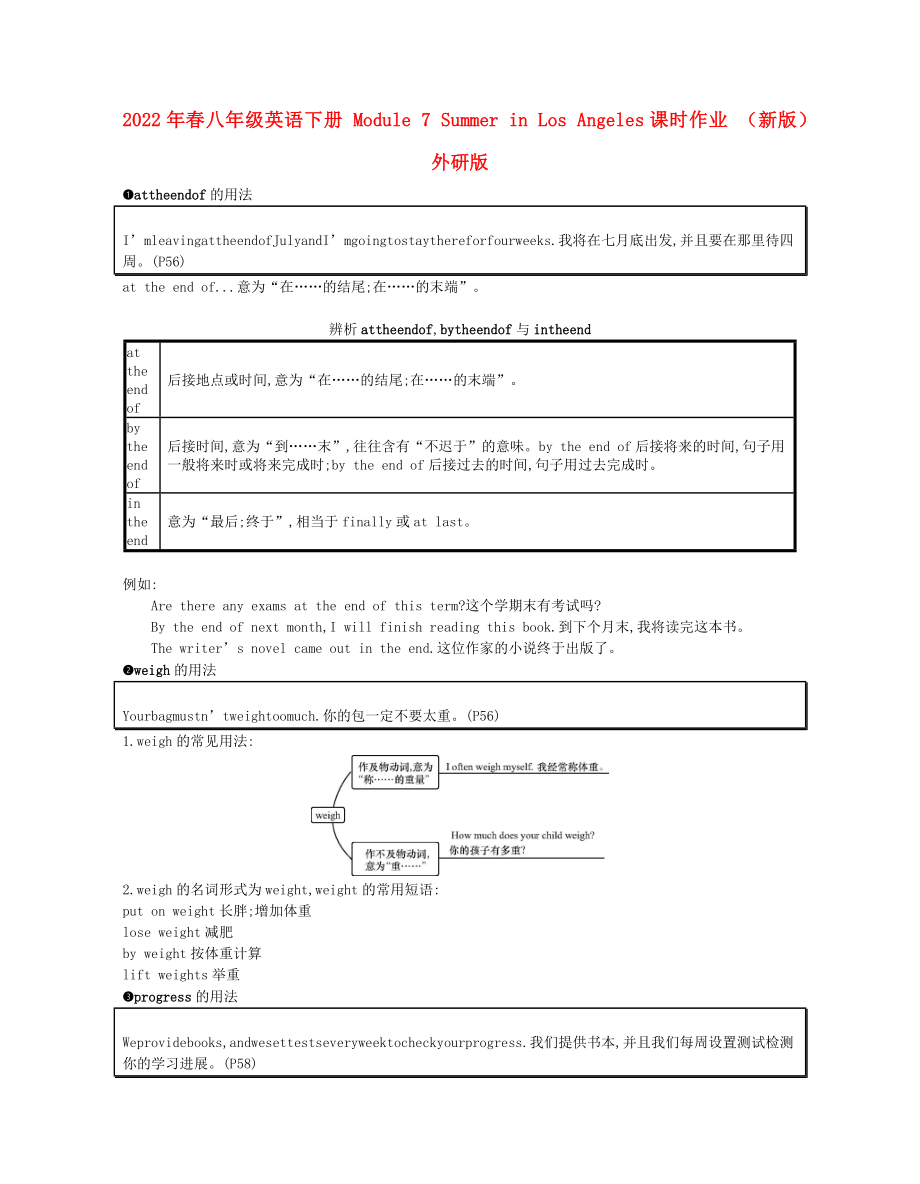《2022年春八年級英語下冊 Module 7 Summer in Los Angeles課時作業(yè) (新版)外研版》由會員分享���,可在線閱讀�,更多相關(guān)《2022年春八年級英語下冊 Module 7 Summer in Los Angeles課時作業(yè) (新版)外研版(2頁珍藏版)》請在裝配圖網(wǎng)上搜索����。
1、2022年春八年級英語下冊 Module 7 Summer in Los Angeles課時作業(yè) (新版)外研版
?attheendof的用法
I’mleavingattheendofJulyandI’mgoingtostaythereforfourweeks.我將在七月底出發(fā),并且要在那里待四周����。(P56)
at the end of...意為“在……的結(jié)尾;在……的末端”。
辨析attheendof,bytheendof與intheend
at the
end of
后接地點或時間,意為“在……的結(jié)尾;在……的末端”�。
by the
end of
后接時間,
2、意為“到……末”,往往含有“不遲于”的意味�。by the end of后接將來的時間,句子用一般將來時或?qū)硗瓿蓵r;by the end of后接過去的時間,句子用過去完成時。
in the
end
意為“最后;終于”,相當(dāng)于finally或at last��。
例如:
Are there any exams at the end of this term?這個學(xué)期末有考試嗎?
By the end of next month,I will finish reading this book.到下個月末,我將讀完這本書�����。
The writer’s novel came out i
3、n the end.這位作家的小說終于出版了����。
?weigh的用法
Yourbagmustn’tweightoomuch.你的包一定不要太重。(P56)
1.weigh的常見用法:
2.weigh的名詞形式為weight,weight的常用短語:
put on weight長胖;增加體重
lose weight減肥
by weight按體重計算
lift weights舉重
?progress的用法
Weprovidebooks,andwesettestseveryweektocheckyourprogress.我們提供書本,并且我們每周設(shè)置測試檢測你的學(xué)習(xí)進展
4��、����。(P58)
progress是不可數(shù)名詞,表示“進步;進展”,常和動詞make連用,構(gòu)成短語make progress,意為“取得進步”�����。表示“取得很大進步”用“make much/great progress”��。表示“在某方面取得進步或進展”時,常和介詞in或with搭配,構(gòu)成短語make progress with/in sth.�����。
?prefer的用法
Butifyouprefer,ofcourse,youcanstayinahotel.但是如果你喜歡,你當(dāng)然可以待在酒店���。(P58)
prefer是及物動詞,其過去式和過去分詞均為preferred,有以下常見用法:
pr
5�����、efersth.
更喜歡某物
prefer A to B
比起B(yǎng)來更喜歡A
prefer to do A
更愿意做A
prefer to do A rather than do B
愿意做A而不愿意做B
prefer doing A to doing B
比起做B更喜歡做A
例如:
—Which subject do you like better,English or maths?英語和數(shù)學(xué),你更喜歡哪一個科目?
—I prefer maths.我更喜歡數(shù)學(xué)�����。
Some children prefer to watch TV rather than go swi
6����、mming.一些孩子寧愿看電視也不愿去游泳。
He prefers swimming to surfing.與沖浪相比,他更喜歡游泳���。
?fillout的用法
Donotwait—filloutourformandetolearnEnglishinLosAngeles!無須再等——填寫我們的表格,來洛杉磯學(xué)習(xí)英語吧!(P58)
1.fill out意為“填寫;填充”�����。
2.fill的其他短語����。
(1)fill...with....意為“用……裝滿……”,表示動作,其主語通常是人���。例如:
He filled the bag with clothes.他在包里裝滿了衣服����。
She filled the bottle with cola.她在瓶子里裝滿了可樂����。
(2)be filled with...意為“裝滿……”,相當(dāng)于be full of...,表示狀態(tài),主語通常是物��。例如:
The bottle is filled with cola.=The bottle is full of cola.瓶子里裝滿了可樂����。
The schoolbag is full of books.=The schoolbag is filled with books.書包里裝滿了書����。
 2022年春八年級英語下冊 Module 7 Summer in Los Angeles課時作業(yè) (新版)外研版
2022年春八年級英語下冊 Module 7 Summer in Los Angeles課時作業(yè) (新版)外研版

